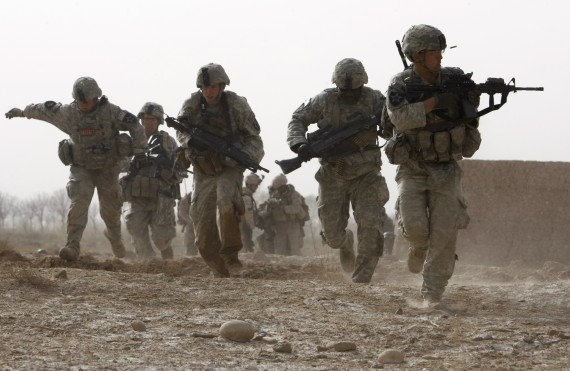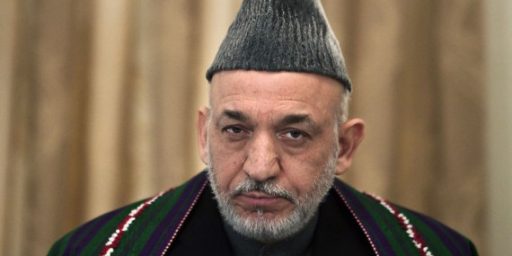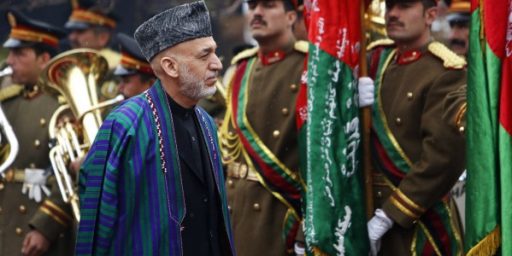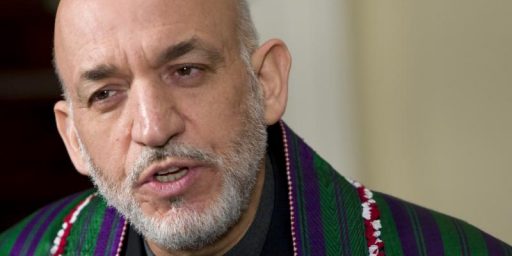Administration Silent On Future Plans For U.S. Troops In Afghanistan
The United States is currently negotiating for a U.S. troop presence in Afghanistan after 2014, but they're not sharing their plans with the American people.
The United States remains on track to withdraw the vast majority of its troops from Afghanistan by the end of 2014, and there doesn’t seem to be any turning back from that at this point. However, at the same time that we’ve been engaged in this draw down, there’s been an ongoing debate, both here in the U.S. and in Afghanistan, about what kind of residual presence we might be leaving behind after the end of 2014. Such a residual force would purportedly be intended to serve to purposes. First, to continue the process of training the Afghan police and military so that the Afghan’s are able to defend themselves. As we’ve seen in recent years, that mission has been met with limited success and has often been set back by the fact that the very people our soldiers were training would turn the guns on them and kill them, the so-called “Green on Blue” attacks. The second purpose of such a residual force would be to allow American forces to make strikes against known terrorist targets, both in Afghanistan and Pakistan. Presumably, this type of force would consist primarily of drone operators, but one imagines that we’d also need a force to defend the base itself. None of the Administration’s future plans for Afghanistan have been shared with the public as of yet, but we got something of a clue as to what might be on their minds in some recent comments from Afghan President Hamid Karzai:
The U.S. wants to keep nine bases in Afghanistan after American combat troops withdraw in 2014 and the Afghan government will let them as long as it gets “security and economic guarantees,” President Hamid Karzai said Thursday in his first public offer in talks about the future relationship between the two uneasy allies.
U.S. officials have made no final announcement about how many troops might remain in Afghanistan after 2014, although they have said as many as many as 12,000 U.S. and coalition forces could remain to train and advise Afghans and continue counterterrorism operations against al-Qaida and other extremists.
The Afghan government would have to approve any such decision, but months of negotiations over a bilateral security agreement have been troubled with disagreements over handing over detainees and anger over alleged misbehavior by American troops.
Karzai has made many statements about the issue but gave his first specific statement about bases at a ceremony at Kabul University.
“We are giving the bases, nine bases they want from Afghanistan in all of Afghanistan,” he said.
But in return, Afghanistan wants a U.S. commitment to boost its security, strengthen its armed forces and promise long-term economic development.
“It is our condition that they bring security and bring it quickly and strengthen the Afghan forces and the economy,” he said. “When they (the U.S.) do this, we are ready to sign” a partnership agreement.
U.S. Embassy spokesman in Kabul, David Snepp, declined to discuss details of the agreement, citing a policy of not commenting on specifics during the ongoing negotiations.
“However, as President Obama has stated, the U.S. does not seek permanent military bases in Afghanistan. We envision that the BSA (Bilateral Strategic Agreement) will address access to and use of Afghan facilities by U.S. forces in the future,” he said.
Karzai did not refer to “existing” bases in his comments, saying only that the U.S. has requested nine bases in the country.
A senior U.S. official familiar with the talks told The Associated Press earlier that the U.S. and Karzai are at odds over his request that the United States guarantee it would side with Afghanistan if neighboring Pakistan poses a threat. So far the U.S. is refusing, the official said, speaking on condition of anonymity because he was not authorized to brief reporters.
Karzai’s comments are somewhat vague, of course. As noted, it’s unclear if he’s talking about bases that would be solely, or mostly, manned by American forces or American access to existing Afghan facilities. It’s also not clear what the size of this force that the U.S. is purportedly contemplating leaving behind. A small training force divided among nine locations is far different from a larger force, as large as the 12,000 that has been mentioned in the past, that is similarly divided and obviously devoted to more than just training. Moreover, as the rest of the linked article goes on to note, it’s quite likely that Karzai may be engaging in some bluster here as a negotiating tactic. Regardless of what the U.S. actually wants, he likely wants to get something from the U.S., such as security guarantees vis a vis Pakistan noted above. Nonetheless, Karzai’s comments to provide us some hints as to what the Obama Administration has planned for the future U.S. role in Afghanistan.
Specifically, it confirms what has been discussed for some time now, that the Obama Administration does indeed intend to leave behind some kind of residual force in Afghanistan after our troops leave in 2014. This is a marked change from what happened with the withdrawal from Iraq, where the we left behind no forces due in no small part to the fact that we were unable to get the Iraqis to agree to a Status Of Forces Agreement that would govern how American forces would be treated under Iraqi law. It’s possible that something similar may yet happen in Afghanistan, but Karzai seems to want U.S. troops to stay behind (for his own protection no doubt) and is much more able to force agreement than Iraq’s Prime Minister was in the months leading up to our withdrawal from Iraq. What’s notable, though, is that there’s been almost no debate in the public about exactly what this residual force deployment would be committing the United States to do, and what the consequences of those commitments might be. There’s also been no discussion about how long this residual force might stay behind. We continue to have American troops in Western Europe and Japan 68 years after World War Two ended, and in South Korea 60 years after the Korean War ended. How long would our Afghanistan commitment last?
There may well be good military and foreign policy for keeping American forces in Afghanistan beyond 2014. However, the American people aren’t being told what those reasons are and Congress isn’t even bothering to inquire into them. Before the Obama Administration makes any kind of agreement with Hamid Karzai, it strikes me that they owe it to the American people to have a discussion here first.







It’s the same gamebook as Iraq: we want to leave entirely, but don’t want to look like we’re running away. So we say we want to stay as long as the government of Afghanistan publicly asks us to stay and grants us legal immunity, knowing it would be political suicide for any Afghan politician to publicly make such a request.
Eventually time runs out and we can through up our hands and do what we actually wanted to do while blaming Afghan intransigence for not letting us stay.
Normally, I’d figure that our withdrawal would quickly turn into a total withdrawal, like with Iraq. We might initially plan to leave some troops in for monitoring and training, but the withdrawal undermines support in the host government for keeping even those troops there, so they end up leaving too.
But with Afghanistan, there’s the aid money question. No doubt that’s what Karzai is hoping to keep – a steady flow of money into the country. If we end up withdrawing and cutting off the aid, the Afghan economy will implode, and their inability to pay for their Army as currently sized would dump a ton of unemployed soldiers into Afghan society.
I hope that MWR opens a nice vacation spot there like in Garmisch or Chiemsee or Hawaii so I can take the family on vacation now that Afghanistan is safe and secure.
I think we were kicked out of Iraq because the Iraqi government felt it could run things itself, and our main concern was probably that the Shiites would commit some sort of genocide against the Kurds or Sunnis — not a concern shared by most of the Iraqi government.
Unlike Iraq, I think our objectives have increased in Afghanistan as the Administration re-conceptualized the mission as the Af-Pak problem, perhaps with more Pak than Af. I think we will have a garrison presence in Afghanistan at least through the end of Obama’s term.
They don’t need to have a roll in Afghanistan as far as I’m concerned. OBL is dead and many others have been killed. Time to get all the troops out of there and let them have their country back. If it means infighting, well they’ll just have to have at it. We’ve been there long enough, far too long in fact. Can’t keep poking our noses into every skirmish that pops up and ride in there on white horses and save the day. Enough! Time to take care of our own country and let others take care of theirs.
@Caj: Agreed. If a terrorist training camp pops up, well, that’s what Tomahawks, drones, and other weapons are for.